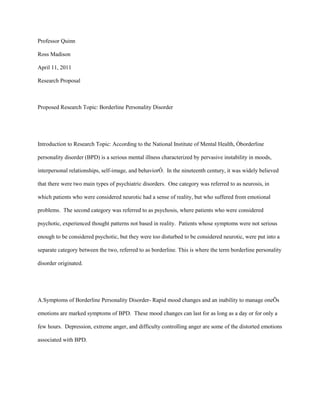Ross memo
- 1. Professor QuinnRoss MadisonApril 11, 2011Research ProposalProposed Research Topic: Borderline Personality Disorder<br />Introduction to Research Topic: According to the National Institute of Mental Health, Òborderline personality disorder (BPD) is a serious mental illness characterized by pervasive instability in moods, interpersonal relationships, self-image, and behaviorÓ. In the nineteenth century, it was widely believed that there were two main types of psychiatric disorders. One category was referred to as neurosis, in which patients who were considered neurotic had a sense of reality, but who suffered from emotional problems. The second category was referred to as psychosis, where patients who were considered psychotic, experienced thought patterns not based in reality. Patients whose symptoms were not serious enough to be considered psychotic, but they were too disturbed to be considered neurotic, were put into a separate category between the two, referred to as borderline. This is where the term borderline personality disorder originated.<br />A.Symptoms of Borderline Personality Disorder- Rapid mood changes and an inability to manage oneÕs emotions are marked symptoms of BPD. These mood changes can last for as long as a day or for only a few hours. Depression, extreme anger, and difficulty controlling anger are some of the distorted emotions associated with BPD.<br />B. Causes of Borderline Personality Disorder- While the exact cause of BPD is unknown at this time, researchers believe that BPD arises as a result of genetic and environmental factors. Most likely, the development of BPD is due to an interaction between these factors.<br />C. Diagnosis of Borderline Personality Disorder- Like with all personality disorders, BPD is diagnosed based on the presence of symptoms, followed by a psychological evaluation if BPD is indicated.<br />D.Treatment for BPD- Successful treatment for borderline personality disorder involves psychotherapy and medication. Psychotherapy is recognized as the choice of treatments for BPD, and medications are used to treat the symptoms, as medications do not help the person with BPD learn the coping skills necessary for management of the disorder.<br />E. Prognosis- Borderline personality disorder is a very difficult disorder to live with because the depression and anxieties that are part of the disorder are also manifested as reactions to the distorted thinking patterns associated with BPD.<br />


